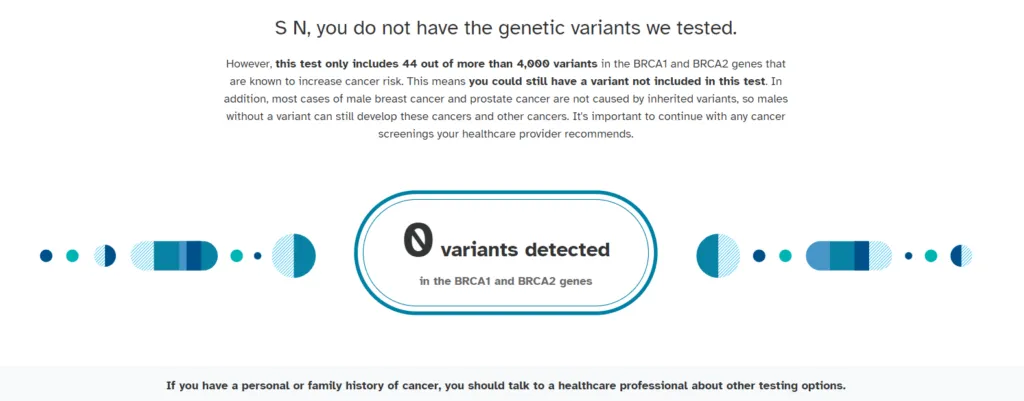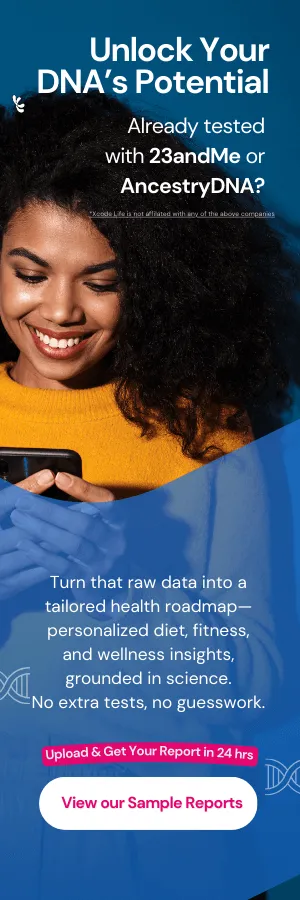Despite the tremendous growth of the healthcare industry, some diseases like cancer remain elusive and hard to handle. Multiple factors contribute to the development and progression of the condition, gene variations being one of them. Genetic testing now makes it possible to know if a person is at risk for developing certain kinds of cancers. The 23andMe BRCA test can check DNA samples for 44 cancer-causing variants and help at-risk individuals take timely preventive actions. What is 23andMe’s BRCA accuracy rate? How much can these test results be trusted? What are the limitations of the test? Keep reading to know more.
Did You Know
Contrary to popular belief, BRCA1 and BRCA2 genes don’t cause breast cancer. In fact, they have a protective role against cancers! In some cases, BRCA1 and BRCA2 genes have mutations that interfere with their protective role. Though these mutations may not definitely cause breast cancer, they do increase the chance for it to develop. Genetic tests can help find faulty genes and help family members find out whether they are at increased risk. Xcode Life looks for these mutations in your ancestry test DNA data and provides you with a comprehensive Breast Cancer Risk analysis. Learn more
23andMe BRCA
Genetic testing can provide essential information about certain health risks, helping individuals take timely preventive actions.
23andMe is a personal genomics company that sells direct-to-consumer health and ancestry genetic testing kits.
23andMe’s testing kits offer a combination of health predisposition, carrier status, wellness, pharmacogenetic, and ancestry reports, depending on the service chosen.
The BRCA1/BRCA2 (Selected Variants) Genetic Health Risk report is one such test report.
According to 23andMe, this test report may tell if a person has an increased risk of developing certain types of cancers due to BRCA gene variations.
23andMe BRCA Report Overview
The 23andMe BRCA1/BRCA2 (Selected Variants) Genetic Health Risk report tests human DNA samples for 44 variants of the Breast Cancer 1 (BRCA1) and Breast Cancer 2 (BRCA2) genes.
The test uses human saliva samples for analysis. It may take up to a few weeks for the users to receive their test results digitally.
BRCA1 And BRCA2 Genes
The BRCA1 and BRCA2 genes help create proteins that are tumor suppressors.
These proteins also repair damaged DNAs and regulate cell division.
According to the Centers for Disease Control and Prevention (CDC), 3% of breast and 10% of ovarian cancers are due to mutations in the BRCA1 and BRCA2 genes.
Mutations in these genes affect both men and women and may also increase their risks of developing uterine, colon, stomach, pancreatic, and testicular cancers.
How Accurate is the 23andMe BRCA Report?
According to the company’s website, all their health report tests, including the BRCA report, meet the Food and Drug Administration’s (FDA’s) analytical and clinical validity requirements.
What does that mean?
- Analytical validity - this talks about the accuracy and reproducibility rates. The 23andMe BRCA test accuracy rate for the 44 variants is >99%. All these variants were also >99% reproducible under different laboratory conditions.
- Clinical validity - this means enough studies and publications exist to relate these variants to specific types of cancers confidently.
The 23andMe BRCA report is the only FDA-authorized direct-to-consumer test for BRCA variants available in the market.
However, the FDA specifies that the 23andMe BRCA report should not be used for diagnosis and cannot be used to make medical decisions.
What does this mean?
It means that even if the BRCA report is >99% accurate, it cannot say if a person would or wouldn’t develop cancer.
Some people with the risk variants may not develop cancer, while those who don’t have the variants could end up with cancer due to other reasons.

Latest: FDA Clears 23andMe To Report On 44 BRCA Variants
The FDA protects public health by monitoring the efficacy and safety of food, drugs, cosmetics, biological products, and radiation-emitting electronics.
The FDA assesses direct-to-consumer genetic tests for reliability, accuracy, clinical validity, and the truthfulness of their claims.
In 2018, the FDA authorized 23andMe’s initial BRCA genetic test.
This test analyzed and reported three variants of the BRCA1 and BRCA2 genes commonly found in people of Ashkenazi Jewish descent.
In August 2023, 23andMe received the FDA 501(k) clearance to test for 41 more variants in both these genes that may be associated with an increased risk of certain types of cancers.
Does This Mean 23andMe’s BRCA Report Is More Accurate?
Does the new FDA clearance mean the 23andMe BRCA accuracy rate has improved drastically?
Since the BRCA test now reports on 44 variants instead of just 3, the chance of the test identifying a person’s risk of developing cancers has improved.
This also means that the BRCA report would now be inclusive of people of different descents instead of just focusing on the Ashkenazi population.
According to the company, this report may have the following ethnic accuracy rate.
- May detect > 90% of BRCA variants in the Ashkenazi population.
- May detect 30-40% of BRCA variants in the African American, Hispanic/Latino, and European populations.
- May detect 35% of BRCA variants in the South Asian population.
- May detect 5-25% of BRCA variants in the East Asian population.
About Xcode Life's BRCA And Breast Cancer Report
Who Can Take 23andMe BRCA Report?
Any adult who can provide a saliva sample can take the 23andMe BRCA report.
Limitations Of 23andMe BRCA Report
- The 23andMe BRCA report is not a comprehensive genetic test option. About 4000 variants of the BRCA1 and BRCA2 genes may cause cancers, and 23andMe checks for only 44.
- This test may include only certain ethnicities and not the global population.
- In rare cases, the 23andMe BRCA report may not be accurate and provide false positive or false negative results.
- The 23andMe BRCA report cannot precisely predict if a person will develop cancer. It only informs if the person is more likely to develop the condition.
- The report does not consider non-genetic factors that may affect cancer development.
What To Do After You Get Your Results?
Once you receive the test results, you may find either of the three terms mentioned in the report.
No Variant Found
This means none of the 44 variants tested were found in your DNA.
This, however, does not mean you have zero risks of developing cancers.
You may still have other cancer-causing variants not part of the test.
Non-genetic factors may also add to the risk.
Variant Found
If one or more variants were found in your test report, you have a higher risk of developing certain types of cancers.
The next step is to make an appointment with your healthcare provider and discuss the findings.
Your doctor may have strategies to prevent or reduce your risk of developing these conditions.
You can also speak to a genetic counselor to get more value from your test report.
This is especially helpful if the findings make you uncomfortable, fearful, or anxious or if you are worried about the risk status of your relatives.
Sometimes, the counselor may advise your closest family members to get their genes tested to see if they carry the same variant.
Result Not Determined
Random test errors, contaminated samples, or other external factors can prevent the lab from successfully analyzing your sample.
In this case, the lab may ask for a new sample.
Summary: 23andMe BRCA Report Accuracy
- The 23andMe BRCA1/BRCA2 (Selected Variants) Genetic Health Risk report analyzes a person’s risk for carrying one or more of the 44 variants that may increase the risk of developing different types of cancers.
- The BRCA1 and BRCA2 genes produce a protein that acts as a tumor suppressor. Variations in these genes may increase the risk of developing cancers.
- Up to 4000 such BRCA gene variations may cause cancer. However, this 23andMe test reports only 44 of these variations.
- On the brand’s website, 23andMe’s BRCA accuracy rate is > 99%. However, this is only relative to the reported 44 variants.
- The 23andMe BRCA report is not comprehensive, as it tests for only some variants. Also, this test cannot predict if a person will develop cancer and can only tell if the person has an increased risk.
- After receiving the test report, talking to a genetic counselor and a healthcare practitioner would help take the right next steps.
References
https://www.ncbi.nlm.nih.gov/pmc/articles/PMC7010426/
https://www.cdc.gov/genomics/disease/breast_ovarian_cancer/genes_hboc.htm
https://www.breastcancer.org/research-news/fda-authorizes-23andme-brca-genetic-test
https://www.fda.gov/medical-devices/in-vitro-diagnostics/direct-consumer-tests




